- Home
- Sandra Chastain
The Judge and the Gypsy
The Judge and the Gypsy Read online
The Judge and the Gypsy is a work of fiction. Names, places, and incidents either are products of the author’s imagination or are used fictitiously.
A Loveswept eBook Edition
Copyright © 1991 by Sandra Chastain.
Excerpt from Flirting with Disaster by Ruthie Knox copyright © 2013 by Ruth Homrighaus.
Excerpt from The Story Guy by Mary Ann Rivers copyright © 2013 by Mary Ann Hudson.
Excerpt from ’Til the End of Time by Iris Johansen copyright © 1986 by Iris Johansen.
All Rights Reserved.
Published in the United States by Loveswept, an imprint of The Random House Publishing Group, a division of Random House, Inc., New York.
LOVESWEPT is a registered trademark of Random House, Inc.
The Judge and the Gypsy was originally published in paperback by Loveswept, an imprint of The Random House Publishing Group, a division of Random House, Inc. in 1991.
Cover Design: Derek Walls
Cover Photo: © Casarsa/istockphoto
eISBN: 978-0-345-54171-0
www.ReadLoveSwept.com
v3.1
For Nita, who’s very special.
Thanks for making me feel that way too.
Contents
Cover
Title Page
Copyright
Dedication
Prologue
Chapter One
Chapter Two
Chapter Three
Chapter Four
Chapter Five
Chapter Six
Chapter Seven
Chapter Eight
Chapter Nine
The Editor’s Corner
Excerpt from Ruthie Knox’s Flirting with Disaster
Excerpt from Mary Ann Rivers’s The Story Guy
Excerpt from Iris Johansen’s ’Til the End of Time
Prologue
“What am I going to do, Zeena? My father intends to kill Judge Webber, the man he holds responsible for my brother’s death.” Savannah Ramey ran a slender hand through her luxuriant ebony tresses.
“I know, my child. It’s the way of the Gypsy; An eye for an eye and a tooth for a tooth.”
Savannah sighed. She’d come to Zeena’s tent for answers, though she knew there were none. Skeptics doubted the circus fortune-teller’s clairvoyant powers, but Savannah believed in the old woman. Still, there were times when answers didn’t come, and others when their meaning was obscure.
Savannah’s delicately arched brows knit together in a frown. “I’m afraid, Zeena. My father is too old to settle a debt. I’ve already lost Tifton—I won’t lose Father too. There must be something I can do. Please, will you help me?”
“I cannot, my child. This time you must look beyond the anger and grief to the power inside you.”
Savannah’s jet eyes glittered with emotion. “All I want to do is make the judge hurt the way we hurt. Death is too easy. I want him to lose part of his heart and live with the loss.”
“Part of his heart?” Zeena echoed.
Savannah nodded. “The problem is that Judge Webber’s only interest is the law. He lives alone. He has no family, no lover, no one to lose.”
The old woman reached across the table and took Savannah’s hand. She’d loved this girl close to eighteen years, since she was a bright nine-year-old grieving the death of her mother. She’d watched Savannah learn to walk the wires, trying desperately to replace the woman who’d been the heart of their little circus world. Zeena had seen Savannah help raise her daredevil younger brother, Tifton, blinding herself to his faults, loving him unconditionally. Now Savannah could feel the current of Zeena’s emotional support flow from the older woman’s fingertips to her own, and prepared to listen carefully to the fortune-teller’s advice.
“Remember this,” Zeena said softly. “A man without love is most in need of it, and suffers the most when it is lost.”
Savannah considered the fortune-teller’s words. And then suddenly she understood. Revenge was up to her. With the ways of a Gypsy, she could capture his heart. Then she could break it. She stood and jutted out her chin.
“I understand now what I must do. I’ll give him what he needs most. Then I’ll take it away.”
“What will you give him, Savannah?”
“I’ll give him myself.”
One
The first time he saw her, she was nude.
It was October, and Rasch Webber was sitting beside the French doors in his study, reading the latest Law Review, when he felt a strange burning sensation on his shoulder. Turning, he saw her.
She was standing on his patio, four stories off the ground. A late night fog swirled about her, masking her features, except for a glorious mane of silver-colored hair that fell across her shoulders and draped her body in a shimmer of reflected light.
He decided that he’d fallen asleep and was having an erotic dream. As he stared, the chrome clock in the foyer struck midnight. He glanced at his watch as if to confirm the exact time of her appearance: twelve o’clock. Rasch rubbed his eyes. He was definitely awake. His gaze went back to the patio; he was certain the vision would have vanished.
She was still there, legs long and slim, arms slightly extended as if to say Here I am, come and get me—if you dare. She wasn’t smiling exactly. In the distance her expression was one of mystery … or sadness. He couldn’t see her eyes, but her arms fell slowly to her sides in what Rasch could only interpret as a gesture of censure.
A sharp gust of air swept the cloud cover from the night sky behind her, and her head tipped back as though she were responding to a voice no one else could hear. For one brief second she stood bathed in moonlight, her silver hair glistening like gossamer sprinkled with beads of stardust.
Rasch caught his breath and remained absolutely still. If this was a dream, he wanted it to continue. If it wasn’t, he knew instinctively that his slightest movement would send her skittering off into the night.
“Are you real?” a voice whispered, and he realized that it was his own.
But she didn’t answer.
Abruptly a curtain of fog seemed to envelop her. There was a faint tinkle of bells, and she was gone.
For a long moment Rasch sat in stunned disbelief. Then he sprang to his feet and dashed through the open doors. But there was no one there, only a lingering low-hanging cloud. Air heavy with mist covered the patio like a gauzy tent. An elusive fragrance wafted momentarily and disappeared. The lone sound was that of the rustling leaves.
Though the night air was cool, Rasch felt as if his body were burning. His heart was pounding, and his breath was quick and fast. He felt alternately cold and hot, calm and excited.
Rasch turned back inside, reaching for his phone to call his doctor. Then he stopped. What would he say? This is Judge Horatio Webber, and there was a beautiful spirit on my patio. No, I don’t know how she got there, or where she went. But she was there, I saw her. Now she’s gone. Am I losing my mind?
Rasch dropped his hand.
Hell, what he had to do first was convince himself. Either she was there, or he was seeing ghosts. And Rasch didn’t believe in ghosts. She had to have been a dream. There was no way a woman could have been on his balcony—even if his body was still singing in response to her electrifying presence.
Judge Webber had never had a waking dream, but he’d read somewhere that stress could do strange things to a man. He might be known as Georgia’s Super Judge in the courtroom, but even a tough guy could have an erotic vision if he was too tired and too lonely. And tonight, he conceded as he stretched his shoulders and went back inside, he was both.
Too many evil people. Too many questions without answers. Too much indifference. Too much isolation for
too many years. For some time he’d felt as if he were struggling against a wind that was stronger than he, as if no matter how much he moved, he remained in the same place. He was still reeling from the results of his get-tough DUI policy.
The boy had come before him, brash, charming, contrite, mitigating his guilt in a traffic accident. He’d lost his license and he didn’t know the car was stolen; the man he was riding with said it was borrowed. It was the woman who’d run the red light, not him.
But Tifton Ramey was drunk when arrested. And Rasch had made an example of him and sentenced him to jail. Then, unexpectedly, in some kind of freak happening, there’d been a fight with another inmate, and the boy was dead.
Rasch’s firm stand on driving under the influence, his policy of getting drunk drivers off the road to protect the public, had resulted in a nightmare. A boy who didn’t deserve the death penalty was dead. Rasch knew that if he had fined Tifton Ramey and put him on probation, the boy would still be alive. But his death had been a fluke, unforeseen in his sentencing.
The story made the front page of the newspapers. It still haunted the judge, who was supposed to be hard as nails, and he couldn’t even talk about it. No wonder he was seeing spirits on his balcony. He needed to get away and do some serious thinking about his future.
Once he’d made up his mind that he’d imagined the vision, Rasch took a cold shower and forcibly put the incident behind him. It wasn’t real. Rasch Webber was a man who dealt with reality, and reality was the harsh truth of the boy’s death. He had to confront that, and his own responsibility in the matter, and stop manufacturing visions in the night as an escape.
God, he was tired.
If she was a dream, she was a recurring one.
The next time Rasch saw his woman of the mists was at Underground Atlanta at a street cocktail party for the politicians, and the rich and famous, of the city of Atlanta. The street was choking with smoke left over from the fireworks display moments earlier. As instructed by Jake Dalton, his old friend and self-appointed campaign manager, Rasch had been greeting the movers and shakers who shaped the political structure of Georgia’s state government.
Just as the fireworks display ended, Rasch felt the beginning of an uneasy burning sensation concentrated at the back of his neck. He caught himself rubbing the spot absently, so frequently that Jake asked him if he had a headache.
“Yes,” Rasch answered, knowing that it wasn’t a headache so much as an odd feeling of anxiety, an awareness that tingled his nerve endings.
“I’ll find an aspirin,” Jake said, and disappeared into the crush of people.
Rasch made his way across the cobbled street and stood in the darkened doorway beneath the wicked-looking gargoyles and intricate carvings along the eaves. He leaned back in the shadows and let the swirl of noise drift across him. This was the part of running for office that he hated, the fund-raising. All he wanted to do was talk to the man on the street—not these men, many of whom who cared more about their own futures than their state’s.
But money guaranteed a platform from which he could plead his case for reforms within the court system. Money would give reality to his vision—if he decided that justice could better be served by his taking political office than by his remaining on the bench.
He felt a sudden electric jab at the nape of his neck like a finger of fire, and lifted his eyes in the direction from which the beam of energy seemed to emanate. He’d felt that sensation before.
In the haze-filled air he saw her.
The woman from his patio was standing beneath one of the great globes of light like a mystical goddess from some fantasy. It was her, his midnight vision. He recognized her—not only visually, but because of a disturbing physical heat she created in him that he couldn’t explain. She was the same woman, yet this time she looked different. Her hair was auburn and woven with brightly colored ribbons that ended in streamers that seemed to cover her body in satin rainbows.
Her face was again shrouded in shadows, but even across the crowd he could sense her sorrow. There was a slight sheen on her face as if of tears, and she shook her head, making a motion toward him that, as on her first appearance, bespoke condemnation.
A fragile, wary look about her touched him physically. He felt a pounding of energy rush through him; the feeling was almost sexual and yet, at the same time, he felt an unusual hint of fear. Who was she?
Rasch looked around. Nobody else seemed to notice her.
“All right, my lady of mystery,” Rasch said, and started toward her. “If you aren’t a figment of my imagination, it’s time we met.” Quickly he threaded his way through the noisy patrons and tipsy party guests until he reached the lamp. She was gone.
“Damn!”
Rasch climbed up on the base of the lamp post and surveyed the throng. The woman was like smoke. One minute she was there, piercing his peace of mind with her gaze. The next she had vanished like a wisp of fog. He swore again.
“Rasch? What are you doing?” Jake had found him. He was bearing a small glass and a concerned expression. “I don’t think that the judge climbing a flagpole is the kind of image we want to portray for the next governor. Maybe you’d better not have anything else to drink.”
Rasch ignored Jake’s remarks. “Did you see her, Jake?”
“Who?”
“The woman with the ribbons in her hair. She was standing right here.”
“No. I’ve seen women with glitter, diamonds, lace, and a couple wearing hats, but no ribbons. Why?”
“I’ve got to find her. She’s driving me crazy.”
Rasch could tell from Jake’s expression that his friend was having serious doubts about his sobriety.
“Sorry, Rasch old buddy, I don’t think I can help you find a woman who isn’t there, but here are your aspirin. Come down from the pole. You’re just tired.”
Rasch came down and swallowed the small white tablets. If his oldest friend already thought he was hallucinating, then telling him that the woman had appeared once before, on a balcony four floors up, would certainly be a mistake. Not even Jake would back a candidate who fantasized about mystery women.
“Tonight,” Jake was saying, “we’ve tried to plant the idea in everyone’s mind that you’re a future candidate for political office. That’s all we want right now. Let’s shake a few more hands.”
“You’re right, Jake. I am tired. Since we’re both going to that conference in Asheville on law and order, I think that I’ll drive up to Amicalola Falls next week and spend a few days hiking the Appalachian Trail. You can pick me up at Bly Gap, and we’ll drive into Asheville together.
“Want some company on the trail?”
“No. After fifteen straight months without a break, I’m ready for some peace and quiet.”
“Maybe a few days in the wilderness is just what you need. Find yourself a lady friend to take along. Let yourself go, Rasch. Stop being so much in control.”
Rasch nodded absently and moved away from the waiter hovering nearby with a tray of empty glasses.
The burning sensation at the base of his neck was less potent but still there. He glanced around. The woman was still there too. He couldn’t see her, but he could feel her. At least he thought he could. Maybe he was hallucinating.
The scent. He recognized it—that same scent from the balcony. He knew who’d worn the perfume, even if she was no longer visible. He rubbed his eyes. Damn, he didn’t believe in ghosts.
And then he saw it.
At the base of the lamp a single red satin ribbon curled across the pillar of white concrete like a smear of blood.
For the rest of the week she was in his mind constantly, frustratingly. The connection was so strong that over and over he turned his head, expecting to catch a glimpse of her in his courtroom, or in the hallway as he moved about the building. The fragrance that was uniquely hers filled his nostrils, and the burning sensation at the base of his skull stayed with him, but he never caught sight of her.
/> On Thursday afternoon the jury returned a guilty verdict in the case he was hearing, and Rasch scheduled sentencing for the following morning. By midafternoon on Friday he was in his 4×4 and headed north. In less than an hour the hazy gray shape of the Blue Ridge Mountains appeared in the distance. With every mile he covered, he felt the tension inside him lift. He’d spend the night under the stars.
Rasch took in a deep breath of fresh air and rubbed the back of his neck. The worrisome tingling seemed to have disappeared. If only he could erase the vision of the woman from his mind—and more important from his body, which kept responding to the thought of her lying beneath him.…
“Are you sure this is the route he is taking?” Savannah Ramey sat in Niko’s battered truck in a patch of woods and wondered why she had ever thought this would work.
“I’m sure. Between Cheno and me, the judge hasn’t made a move that we don’t know about. The man is a robot. He gets up at the same time every morning, wears the gray suit every Monday, the pinstripe every Tuesday, eats at the same restaurant, parks in the same place—”
“Okay, I get the idea, Judge Horatio Webber is a creature of habit.” He was also entirely too appealing. His stunned look of disbelief when she’d first seen him on his balcony had almost made her change her mind. If he’d been anyone else, she’d have been attracted to the disturbingly handsome man who was her sworn enemy.
“Exactly. Tough, honest, but he’s still a sucker for somebody in distress.”
“That’s what I’m counting on. If he decides to check the truck, it won’t crank, will it?”
“No,” her circus companion replied, his concern over her scheme still plain in his expression.
“I don’t want him to realize that this is a setup. It’s better if I keep him confused.”
“If he isn’t confused by a woman who appears on his balcony as a blonde, in a crowded street as a redhead, and on a mountain as a dark-haired witch, I don’t know what else you can do.”
Sometimes she was a little confused. How could a man regarded as a champion of the underdog be the callous killer of her brother?

 The Redhead and the Preacher: A Loveswept Historical Romance
The Redhead and the Preacher: A Loveswept Historical Romance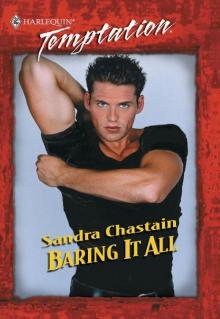 Baring It All (Mills & Boon Temptation)
Baring It All (Mills & Boon Temptation) Adam’s Outlaw
Adam’s Outlaw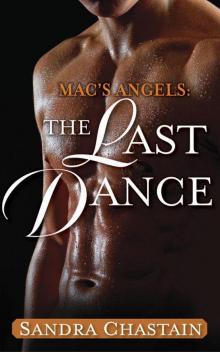 Mac's Angels: The Last Dance: A Loveswept Classic Romance
Mac's Angels: The Last Dance: A Loveswept Classic Romance Imaginary Lover
Imaginary Lover The Judge and the Gypsy
The Judge and the Gypsy Silver Bracelets: A Loveswept Contemporary Classic Romance
Silver Bracelets: A Loveswept Contemporary Classic Romance Penthouse Suite
Penthouse Suite Lean Mean Loving Machine: A Loveswept Classic Romance
Lean Mean Loving Machine: A Loveswept Classic Romance Joker's Wild
Joker's Wild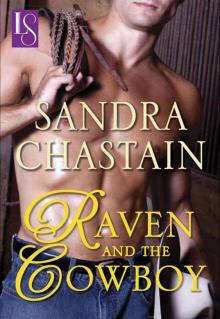 Raven and the Cowboy: A Loveswept Historical Romance
Raven and the Cowboy: A Loveswept Historical Romance Night Dreams
Night Dreams The Outlaw Bride
The Outlaw Bride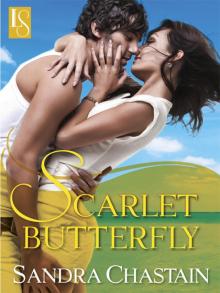 Scarlet Butterfly
Scarlet Butterfly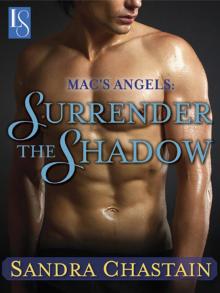 Mac's Angels
Mac's Angels Run Wild With Me
Run Wild With Me Lean Mean Loving Machine
Lean Mean Loving Machine